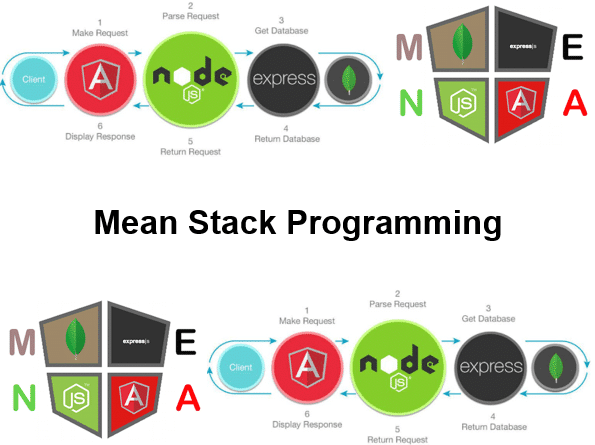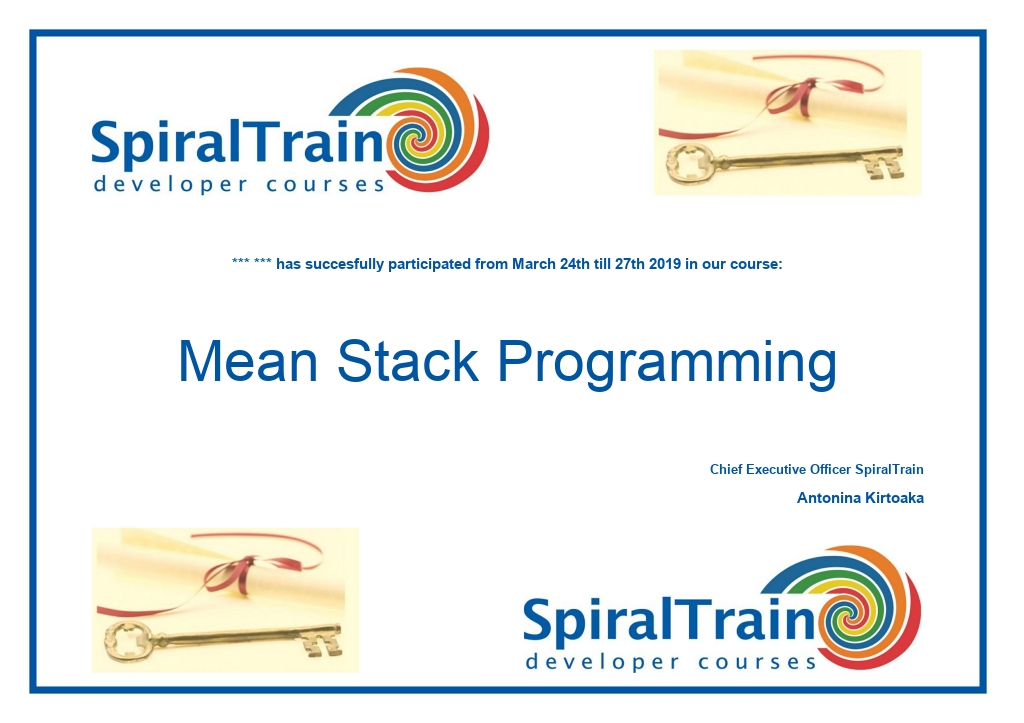-
Learning by doing
-
Trainers with practical experience
-
Classroom training
-
Detailed course material
-
Clear content description
-
Tailormade content possible
-
Training that proceeds
-
Small groups
In the course MEAN Stack Programming participants learn to develop full stack web applications with MongoDB, Express, Angular and NodeJS (MEAN). With the MEAN stack and the underlying technologies, high-quality full stack web applications can be developed that are only based on HTML, CSS and JavaScript.
The course starts with an overview of Full Stack Web Development and the architecture of the MEAN stack. The NodeJS ecosystem is explained with the npm package manager for dependency management of packages, modules and Global Objects. The principles of Single Page Applications (SPA) that are based on Ajax technology are also discussed.
Next the server side JavaScript library NodeJS is treated in more detail. Attention is paid to the central NodeJS event loop, the difference between synchronous and asynchronous calls and the use of promises instead of callbacks.
Then attention is paid to the Express Framework, which consists of a number of node modules that create a server side web application framework. An Express Server actually consists of three components, the router, the routes and middleware components.
It is explained how Express responds to the HTTP protocol and acts as a REST server. The principles of REST services are treated where content is served based on URL patterns and HTTP verbs such as GET, POST and PUT.
The latest version of the Angular JavaScript Frontend Framework for SPA applications is also part of the program of the course. Angular Routing, Typescript and Angular Forms are treated here.
Finally the MongoDB database for NoSQL data storage on the server is discussed as well as the creation of MongoDB collections and the execution of queries.
The course Mean Stack Programming is designed for Web Developers who want to use the Mean Stack with MongoDB, Express, Angular and NodeJS to develop modern single page Web Applications.
Experience with JavaScript programming and a good knowledge of JavaScript is required to participate in this course.
The theory is discussed on the basis of presentation slides. The concepts are explained with demos. The theory is interchanged with exercises. Course times are from 9:30 am to 16:30 pm.
After successful completion of the course participants receive an official certificate Mean Stack Programming.

Module 1 : Mean Stack Intro |
Module 2 : NodeJS |
Module 3 : Express Framework |
|
Full Stack Development Mean Stack Architecture NodeJS and nmp NodeJS Ecosystem Using Packages Global Objects NodeJS Module System package.json NoSQL Databases MongoDB Single Page Applications Angular Framework MVC Patterm |
Node’s Event Loop Interleaving Events Timers Synchronous versus Asynchronous Blocking versus Non Blocking Using Callbacks Synchronous Mode Asynchrony with Callbacks Node Events Callback versus Events EventEmitter Class Emitting Once Asynchrony with Promises |
Node Web Server Node Web Client What is Express? Important Modules Request Properties Request Methods Response Properties Response Methods Basic Routing Serving Static Files Get and Post Method File Upload Cookies Management |
Module 4 : Rest Services |
Module 5 : Angular Framework |
Module 6 : TypeScript |
|
REST Web Services REST Principles ID and Links Multiple Representation Common REST Patterns Resource URI Access Patterns JSON JSON versus XML List Users API Add User API Path Parameters Delete API |
Bootstrapping Angular Displaying data Using Directives Dependency Injection Templates Annotations Views Controllers Data Binding Input and Outputs Angular Services Modules |
Weak Typing in JavaScript Strong Typing in TypeScript ECMAScript Standard Using Built-in Types Inferred Typing Explicit Casting Classes Interfaces Decorators Iterators Generics Sync and await |
Module 7 : Routing |
Module 8 : Forms |
Module 9 : MongoDB |
|
Angular Routes Routing Configuration Route Comparison Routing Parameters Configuring routes Linking to Routes Guards Child routes Sibling routes Lazy Loading Routes |
Template Driven Forms Model-driven Forms Tracking Changes by CSS Control ControlGroup FormBuilder Validation Error Messages Custom Validators Asynchronous Validators |
Mongoose Node Module Mongoose Schema's ObjectID Schema Type Mongoose Models Create Database in MongoDB Create Collection Insert into Collection Insert Multiple Documents Find One, All or Some Queries |
